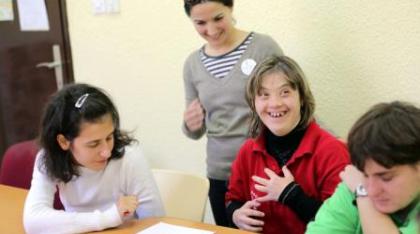Spotlight
A selection of resources from across the Federation

Abortion Care and Costs in Europe and Central Asia
IPPF EN carried out research into the economic burden that women face in accessing abortion care in Europe and Central Asia. This factsheet provides a snapshot of the findings.
Filter our resources by:

| 05 June 2016
Marian and Nicoleta
Meet Marian and Nicoleta. Their unique love story highlights the importance of ensuring that everyone, everywhere has the love and happiness they deserve.
| 13 May 2016
Eugenia's Story
Meet Eugenia Behar, a clinical psychologist working with young people with learning difficulties in Romania, a country where there is still no obligatory sexuality education across all schools, particularly for those with learning difficulties.
| 07 January 2016
Access to Modern Contraceptive Choice in Eastern Europe and Central Asia
The factsheet presents data and trends in the use of contraceptives in Eastern Europe and Central Asian (EECA), highlighting major factors influencing contraceptive behaviour, demand and access. It explains what role donors can play to enable women in EECA to access modern contraceptive methods.

| 15 January 2015
Women's access to modern contraceptive choice - Barometer 2015
A ‘Barometer’ report launched by IPPF EN in 2015 analyses how easily women in 16 EU countries can access modern contraceptives. It finds that overall, the situation in most countries has stagnated or worsened in recent years. The EU countries covered by the report are: Bulgaria, Cyprus, Czech Republic, Denmark, Finland, France, Germany, Ireland, Italy, Latvia, Lithuania, The Netherlands, Poland, Romania, Spain, and Sweden. Information on participating national partners can be found in the report. The report’s findings are based on information about the national policy landscapes provided by national experts in each of the 16 countries, using a series of policy benchmarks that are key to ensuring access to modern contraceptives. The information was collected, analysed and reviewed between May and November 2014. The report is endorsed by the European Society of Contraception and Reproductive Health (ESC) and International Centre for Reproductive Health (ICRH).
| 10 January 2015
Call to Action: Women's access to modern contraceptive choice - Barometer 2015
We call on national decision-makers to support the implementation of a comprehensive approach to contraceptive choice in the 16 countries within a broader sexual and reproductive health and rights agenda. This is fundamental to ensuring the wellbeing of all women and girls, particularly the most vulnerable and is a crucial precondition to allowing women and couples the freedom to choose parenthood or not. It is a competence of EU Member States to formulate and implement SRHR policies at a national level. Yet when it comes to public health and non-discrimination, the EU can exercise policy-making, foster research and the exchange of best practices, and better support the implementation of SRHR at national level. Therefore, the Barometer partners call for a structured dialogue involving all relevant stakeholders at EU and national levels. Additionally, we urge the EU to make a greater investment in SRHR research and data collection.

| 12 December 2014
Preventing sexual abuse and violence against young people with learning disabilities - policy recommendations
People with learning disabilities have a right to be protected from sexual violence and abuse, yet 90% of them will experience sexual abuse at some point in their life, most frequently from family members or others in their close circle. Safeguarding this right can only be achieved if people with learning disabilities are empowered to protect themselves. Increasing their autonomy in relation to their sexual lives, relationships, bodies and privacy is key. But how can people with learning disabilities be expected to say no to sexual violence and abuse, if even the smallest aspects of daily life are decided for them by others? In this context, it is crucial to strengthen their overall autonomy, active participation and integration in society, and the transition from institutions to community based-care. The 2-year ‘Keep me Safe’ project aimed to empower young people with learning disabilities to protect themselves against sexual abuse and violence across Europe. It was co-funded by the European Commission Daphne III Programme. On 11-12 December 2014, IPPF Member Associations, NGOs, parents of young people with learning disabilities, decision-makers and authorities from Bulgaria, Cyprus, Germany, Ireland, Latvia, The Netherlands, Macedonia, Romania, Spain, and UK, as well as staff from the IPPF EN regional office, gathered in Madrid for its final event. Here you can download the set of Policy recommendations they developed and endorsed at the meeting.

















